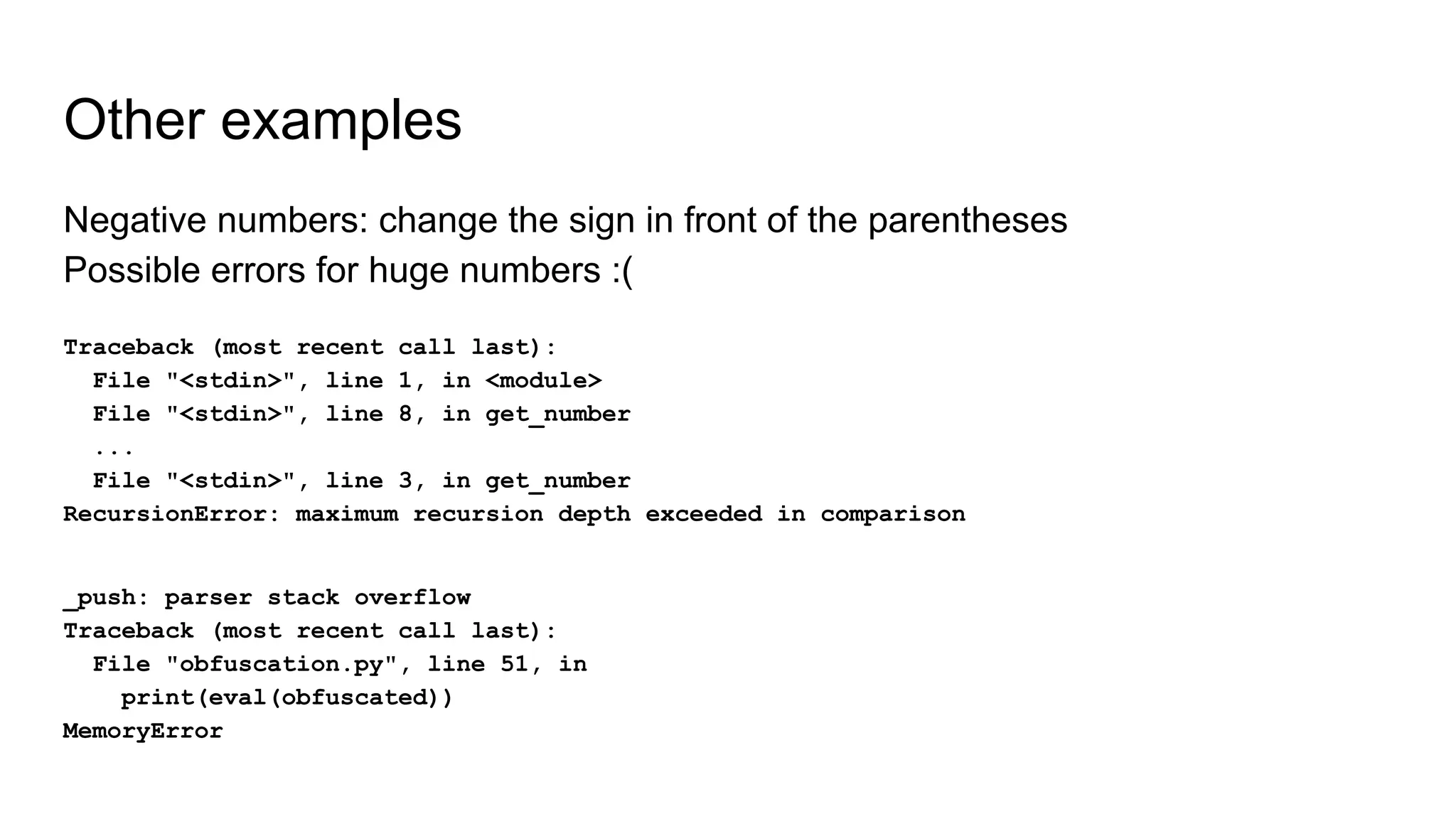The document discusses number obfuscation in Python, detailing how comparisons between different types, such as lists and dictionaries, behave in Python 2 versus Python 3. It provides examples of how to transform numbers into obfuscated forms using logical operations and hexadecimal conversion techniques. It also includes functions for converting numbers and handling recursive operations, along with links for further information.
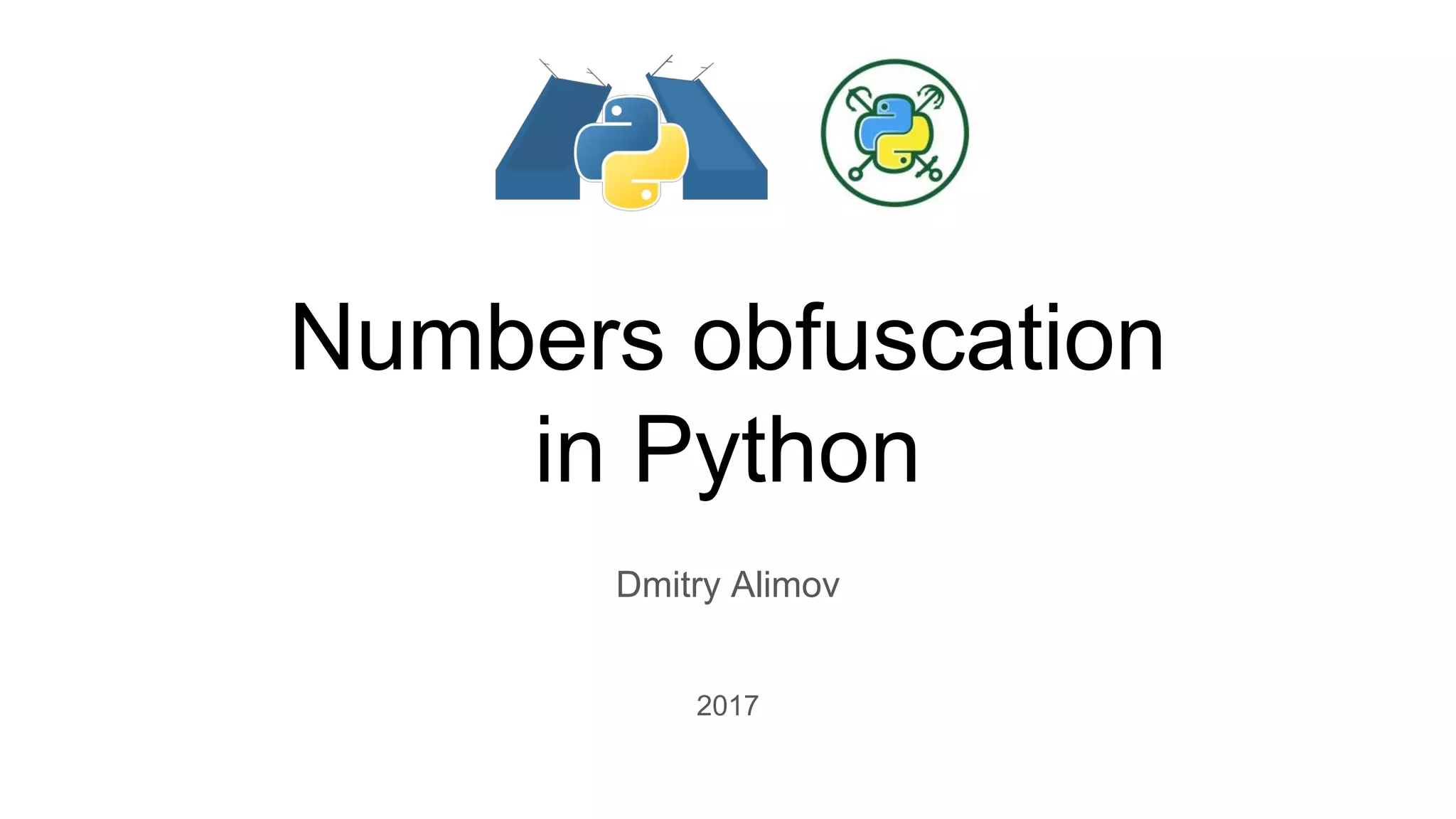
![Types comparison
>>> {} > [] # i.e. 'd' > 'l' ([d]ict > [l]ist)
False
>>> [] > {} # i.e. 'l' > 'd' ([l]ist > [d]ict)
True
Python 2 only!
CPython implementation detail: Objects of different types except numbers
are ordered by their type names; objects of the same types that don’t
support proper comparison are ordered by their address.](https://image.slidesharecdn.com/numbersobfuscationinpython2-180214100756/75/Numbers-obfuscation-in-Python-2-2048.jpg)
![Fixed in Python 3
>>> {} > []
Traceback (most recent call last):
File "<stdin>", line 1, in <module>
TypeError: '>' not supported between instances of 'dict' and 'list'
Let's use the following approach in Python 3:
>>> [] < []
False](https://image.slidesharecdn.com/numbersobfuscationinpython2-180214100756/75/Numbers-obfuscation-in-Python-3-2048.jpg)
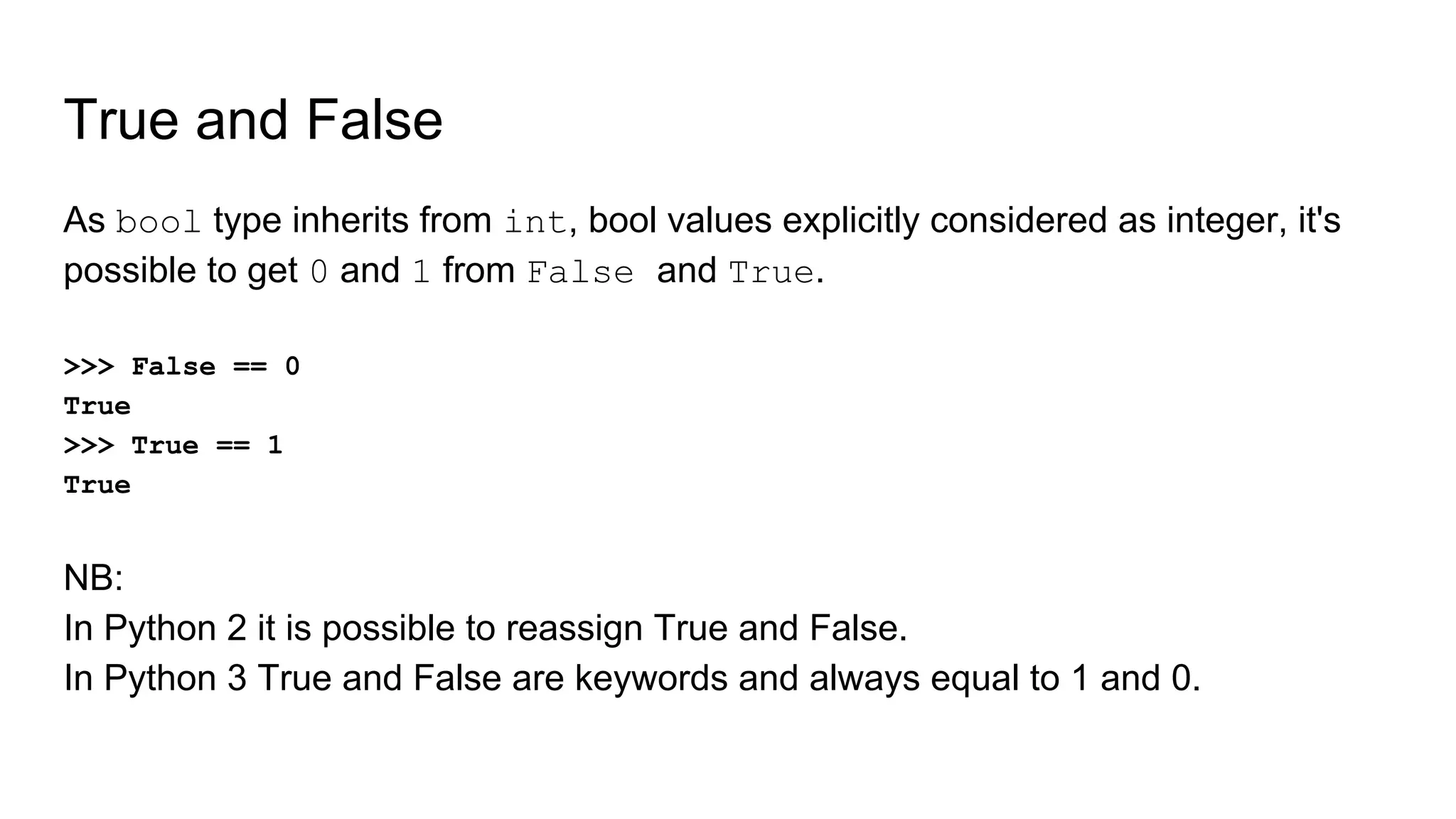
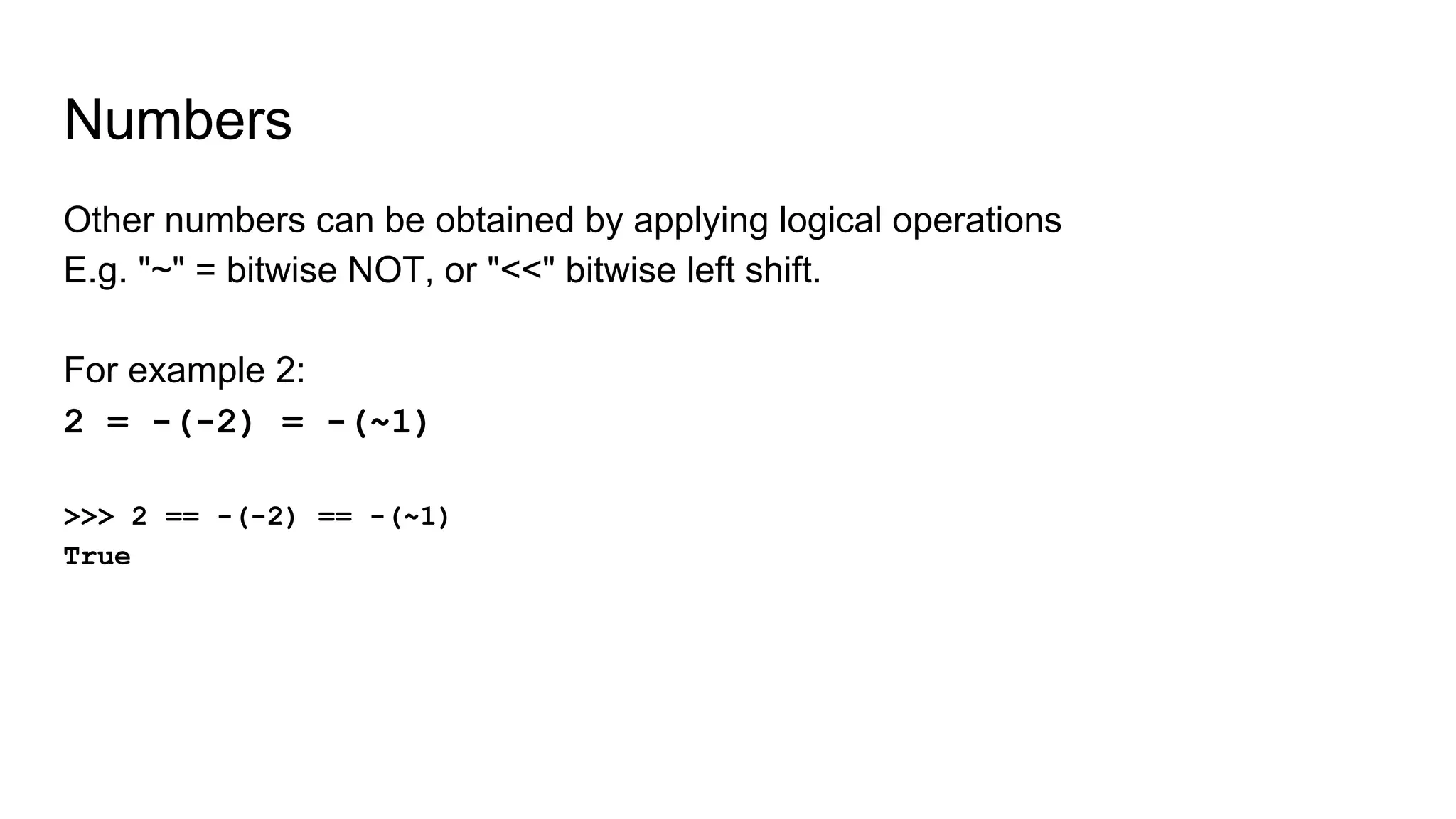
![Numbers (Python 2)
nums = [
'([]<{})', # 0
'([]>{})', # 1
'-~([]>{})', # 2
'-~-~([]>{})', # 3
'-~-~-~([]>{})', # 4
'-~-~-~-~([]>{})', # 5
'-~-~-~-~-~([]>{})', # 6
'-~-~-~-~-~-~([]>{})', # 7
'-~-~-~-~-~-~-~([]>{})', # 8
'~-~([]>{})*~-~([]>{})', # 9
'~-~-~-~([]>{})*~([]>{})', # 10
'-~-~(~-~([]>{})*~-~([]>{}))', # 11
'(-~-~([]>{})<<-~([]>{}))', # 12
'-~(-~-~([]>{})<<-~([]>{}))', # 13
'-~-~-~-~-~-~([]>{})*-~([]>{})', # 14
'~-~([]>{})*~-~-~-~([]>{})', # 15
'(-~([]>{})<<-~-~([]>{}))', # 16
]
numbers_count = len(nums) - 1](https://image.slidesharecdn.com/numbersobfuscationinpython2-180214100756/75/Numbers-obfuscation-in-Python-6-2048.jpg)
![Numbers (Python 3)
nums = [
'([]<[])', # 0
'(-~([]<[]))', # 1
'-~(-~([]<[]))', # 2
'-~-~(-~([]<[]))', # 3
'-~-~-~(-~([]<[]))', # 4
'-~-~-~-~(-~([]<[]))', # 5
'-~-~-~-~-~(-~([]<[]))', # 6
'-~-~-~-~-~-~(-~([]<[]))', # 7
'-~-~-~-~-~-~-~(-~([]<[]))', # 8
'~-~(-~([]<[]))*~-~(-~([]<[]))', # 9
'~-~-~-~(-~([]<[]))*~(-~([]<[]))', # 10
'-~-~(~-~(-~([]<[]))*~-~(-~([]<[])))', # 11
'(-~-~(-~([]<[]))<<-~(-~([]<[])))', # 12
'-~(-~-~(-~([]<[]))<<-~(-~([]<[])))', # 13
'-~-~-~-~-~-~(-~([]<[]))*-~(-~([]<[]))', # 14
'~-~(-~([]<[]))*~-~-~-~(-~([]<[]))', # 15
'(-~(-~([]<[]))<<-~-~(-~([]<[])))', # 16
]
numbers_count = len(nums) - 1](https://image.slidesharecdn.com/numbersobfuscationinpython2-180214100756/75/Numbers-obfuscation-in-Python-7-2048.jpg)
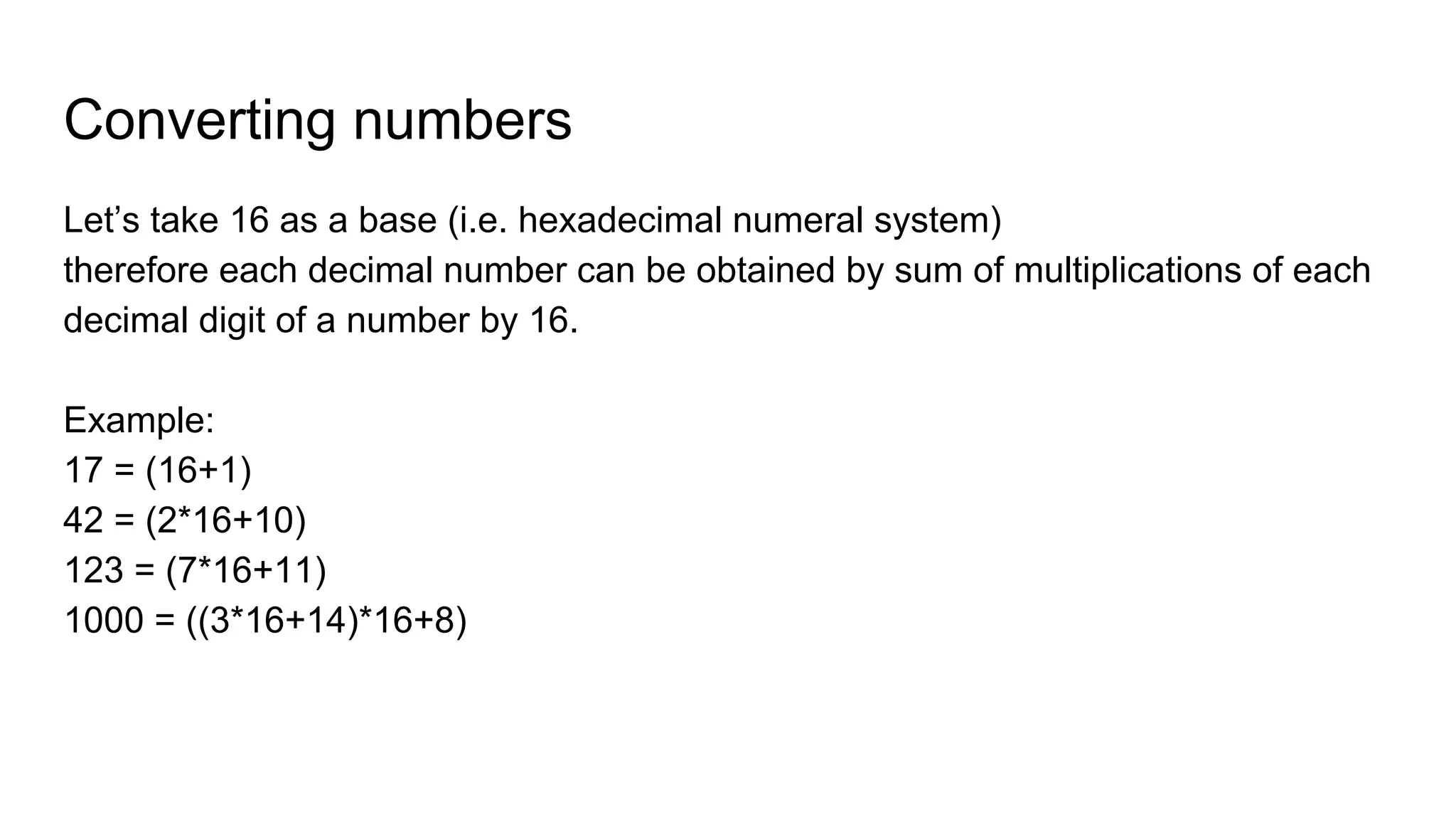
![Converting numbers
def get_number(num):
r = ''
if num > numbers_count:
if num // numbers_count > 1:
if num % numbers_count == 0:
r += '(%s*%s)' % (get_number(num // numbers_count), numbers_count)
else:
r += '(%s*%s+%s)' % (get_number(num // numbers_count), numbers_count, num % numbers_count)
else:
r += '(%s+%s)' % (numbers_count, get_number(num - numbers_count))
else:
r = '%s' % num
return r
def convert_nums(s):
res = s
for n in range(numbers_count, -1, -1):
res = res.replace(str(n), nums[n])
res = res.replace('+-', '-')
return res](https://image.slidesharecdn.com/numbersobfuscationinpython2-180214100756/75/Numbers-obfuscation-in-Python-9-2048.jpg)
![Examples
num = 1234567
num_str = get_number(num)
num_str = num_str[1:-1] if num_str[0] == '(' and num_str[-1] == ')' else num_str
print(num_str)
# ((((16+2)*16+13)*16+6)*16+8)*16+7
obfuscated = convert_nums(num_str)
print(obfuscated)
#(((((-~([]>{})<<-~-~([]>{}))-~([]>{}))*(-~([]>{})<<-~-~([]>{}))-~(-~-~([]>{})<<-~([]>{})))
*(-~([]>{})<<-~-~([]>{}))-~-~-~-~-~([]>{}))*(-~([]>{})<<-~-~([]>{}))-~-~-~-~-~-~-~([]>{}))*
(-~([]>{})<<-~-~([]>{}))-~-~-~-~-~-~([]>{})
print(eval(obfuscated))
# 1234567](https://image.slidesharecdn.com/numbersobfuscationinpython2-180214100756/75/Numbers-obfuscation-in-Python-10-2048.jpg)
![Examples
Python 2:
1234567 = ((((16+2)*16+13)*16+6)*16+8)*16+7 =
(((((-~([]>{})<<-~-~([]>{}))-~([]>{}))*(-~([]>{})<<-~-~([]>{}))-~(-~-~([]>{})<<-~([]>{})))*
(-~([]>{})<<-~-~([]>{}))-~-~-~-~-~([]>{}))*(-~([]>{})<<-~-~([]>{}))-~-~-~-~-~-~-~([]>{}))*(
-~([]>{})<<-~-~([]>{}))-~-~-~-~-~-~([]>{})
Python 3:
1234567 = ((((16+2)*16+13)*16+6)*16+8)*16+7 =
(((((-~(-~([]<[]))<<-~-~(-~([]<[])))-~(-~([]<[])))*(-~(-~([]<[]))<<-~-~(-~([]<[])))-~(-~-~(
-~([]<[]))<<-~(-~([]<[]))))*(-~(-~([]<[]))<<-~-~(-~([]<[])))-~-~-~-~-~(-~([]<[])))*(-~(-~([
]<[]))<<-~-~(-~([]<[])))-~-~-~-~-~-~-~(-~([]<[])))*(-~(-~([]<[]))<<-~-~(-~([]<[])))-~-~-~-~
-~-~(-~([]<[]))](https://image.slidesharecdn.com/numbersobfuscationinpython2-180214100756/75/Numbers-obfuscation-in-Python-11-2048.jpg)
